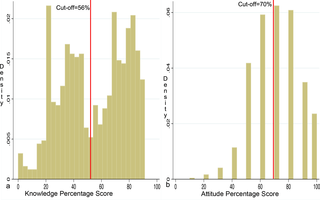PLOS Neglected Tropical Diseases ( IF 3.4 ) Pub Date : 2017-09-11 , DOI: 10.1371/journal.pntd.0005907 Luke Nyakarahuka , Eystein Skjerve , Daisy Nabadda , Doreen Chilolo Sitali , Chisoni Mumba , Frank N. Mwiine , Julius J. Lutwama , Stephen Balinandi , Trevor Shoemaker , Clovice Kankya

|
Background
Uganda has reported five (5) Ebola virus disease outbreaks and three (3) Marburg virus disease outbreaks from 2000 to 2016. Peoples’ knowledge and attitude towards Ebola and Marburg virus disease impact on control and prevention measures especially during outbreaks. We describe knowledge and attitude towards Ebola and Marburg virus outbreaks in two affected communities in Uganda to inform future outbreak responses and help in the design of health education and communication messages.
Methods
The study was a community survey done in Luweero, Ibanda and Kamwenge districts that have experienced outbreaks of Ebola and Marburg virus diseases. Quantitative data were collected using a structured questionnaire and triangulated with qualitative participatory epidemiology techniques to gain a communities’ knowledge and attitude towards Ebola and Marburg virus disease.
Results
Out of 740 respondents, 48.5% (359/740) were categorized as being knowledgeable about Ebola and Marburg virus diseases, whereas 60.5% (448/740) were having a positive attitude towards control and prevention of Ebola and Marburg virus diseases. The mean knowledge and attitude percentage scores were 54.3 (SD = 23.5, 95%CI = 52.6–56.0) and 69.9 (SD = 16.9, 95%CI = 68.9–71.1) respectively. People educated beyond primary school were more likely to be knowledgeable about Ebola and Marburg virus disease than those who did not attain any formal education (OR = 3.6, 95%CI = 2.1–6.1). Qualitative data revealed that communities describe Ebola and Marburg virus diseases as very severe diseases with no cure and they believe the diseases spread so fast. Respondents reported fear and stigma suffered by survivors, their families and the broader community due to these diseases.
Conclusion
Communities in Uganda affected by filovirus outbreaks have moderate knowledge about these diseases and have a positive attitude towards practices to prevent and control Ebola and Marburg viral diseases. The public health sector should enhance this community knowledge gap to empower them more by supplying educational materials for epidemic preparedness in future using appropriate communication channels as proposed by the communities.
中文翻译:

使用定量和参与式流行病学技术对乌干达埃博拉和马尔堡病毒病的知识和态度
背景
乌干达报告了2000年至2016年的五(5)例埃博拉病毒病暴发和三(3)例马尔堡病毒病暴发。人们对埃博拉和马尔堡病毒病的了解和态度对控制和预防措施产生了影响,尤其是在暴发期间。我们描述了乌干达两个受影响社区对埃博拉和马尔堡病毒暴发的知识和态度,以为未来的暴发应对提供信息,并帮助设计健康教育和交流信息。
方法
该研究是在经历埃博拉病毒和马尔堡病毒病暴发的卢韦耶罗,伊班达和卡姆温格地区进行的一项社区调查。使用结构化问卷收集定量数据,并使用定性参与流行病学技术进行三角测量,以获取社区对埃博拉和马尔堡病毒病的知识和态度。
结果
在740名受访者中,有48.5%(359/740)被了解埃博拉和马尔堡病毒病,而60.5%(448/740)对控制和预防埃博拉和马尔堡病毒病持积极态度。平均知识和态度百分比得分分别为54.3(SD = 23.5,95%CI = 52.6-56.0)和69.9(SD = 16.9,95%CI = 68.9-71.1)。受过小学教育的人比没有接受过正规教育的人更了解埃博拉和马尔堡病毒病(OR = 3.6,95%CI = 2.1–6.1)。定性数据显示,社区将埃博拉和马尔堡病毒病描述为无法治愈的非常严重的疾病,他们相信这些疾病传播得如此之快。受访者表示幸存者感到恐惧和污名,
结论
受到丝状病毒爆发影响的乌干达社区对这些疾病有一定的了解,并对预防和控制埃博拉和马尔堡病毒性疾病的做法持积极态度。公共卫生部门应通过社区提议的适当沟通渠道,为将来的流行病防备提供教育材料,从而扩大社区知识差距,以增强他们的能力。











































 京公网安备 11010802027423号
京公网安备 11010802027423号